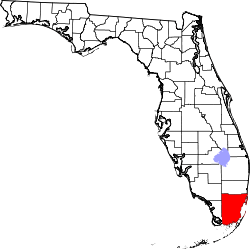El Portal, Florida
El Portal is a village in Miami-Dade County, Florida, United States. The village name is derived from the Spanish term for "the gate," after two wooden gates that once stood as a gateway to the village. El Portal was originally a neighborhood of the City of Miami when it was annexed into the City of Miami in 1925. With the arrival of the Great Depression, the City of Miami gave up its jurisdiction and El Portal was incorporated as its own village in 1937.
El Portal, Florida | |
|---|---|
| Village of El Portal | |
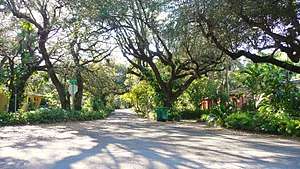 Typical street in El Portal | |
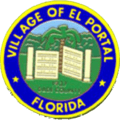 Seal | |
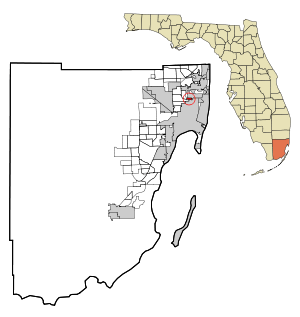 Location in Miami-Dade County and the state of Florida | |
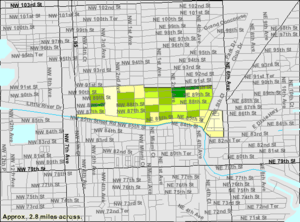 U.S. Census Bureau map showing village boundaries | |
| Coordinates: 25°51′18.62″N 80°11′39.01″W | |
| Country | |
| State | |
| County | |
| Incorporated | December 6, 1937 |
| Government | |
| • Type | Commission |
| • Mayor | Claudia V. Cubillos |
| • Vice Mayor | Omarr C. Nickerson |
| • Councilmembers | Vimari Roman and Harold E. Mathis, Jr. |
| • Village Manager | Christia Alou |
| • Village Clerk | Yenise Jacobi |
| Area | |
| • Village | 0.42 sq mi (1.09 km2) |
| • Land | 0.41 sq mi (1.08 km2) |
| • Water | 0.01 sq mi (0.01 km2) 0% |
| Elevation | 7 ft (2 m) |
| Population (2010) | |
| • Village | 2,325 |
| • Estimate (2019)[2] | 2,398 |
| • Density | 5,778.31/sq mi (2,230.28/km2) |
| • Metro | 5,422,200 |
| Time zone | UTC-5 (EST) |
| • Summer (DST) | UTC-4 (EDT) |
| Zip Codes | 33138, 33150 |
| Area code(s) | 305, 786 |
| FIPS code | 12-20650[3] |
| GNIS feature ID | 0282132[4] |
| Website | Village of El Portal |
History
El Portal is a small, diverse enclave between Miami Shores and Miami. It was incorporated on December 6, 1937. The enclave was originally the capital of the Tequesta tribal area, and was visited by Pedro Menéndez de Avilés in the 1560s.[5] Three small subdivisions (now neighborhoods)—Sherwood Forest, El Jardin (Spanish for "The Garden"), and El Portal—merged into the Village of El Portal.[6] Its borders include 91st Street on the north, 85th Street on the south, Northeast Fifth Avenue on the east and Northwest Fifth Avenue on the west.
The village's name is a Spanish term meaning "the gate," referring to two huge wooden gates on Northeast Second Avenue that were taken down in the 1940s.[5]
The village was also designated as a bird sanctuary by the state for more than 50 years, which means that the birds and trees cannot be harmed in any way. A nature trail winds its way through the village. El Portal also boasts links to prehistoric Indian life at the Little River Mound, a four-foot-high, innocuous grassy knoll that is actually an ancient burial ground. The Little River Mound, located in the Sherwood Forest neighborhood, is the first archaeological site to be publicly recognized and preserved in Miami-Dade County.[7]
Geography
El Portal is located at 25°51′19″N 80°11′39″W (25.855173, -80.194168).[8]
According to the United States Census Bureau, the village has a total area of 0.4 square miles (1.0 km2), all land.
Surrounding areas
- Miami Shores
- Unincorporated Miami-Dade County



- Unincorporated Miami-Dade County, Pinewood


- West Little River



- West Little River, Miami
Demographics
| Historical population | |||
|---|---|---|---|
| Census | Pop. | %± | |
| 1940 | 365 | — | |
| 1950 | 1,371 | 275.6% | |
| 1960 | 2,079 | 51.6% | |
| 1970 | 2,068 | −0.5% | |
| 1980 | 2,055 | −0.6% | |
| 1990 | 2,457 | 19.6% | |
| 2000 | 2,505 | 2.0% | |
| 2010 | 2,325 | −7.2% | |
| Est. 2019 | 2,398 | [2] | 3.1% |
| U.S. Decennial Census[9] | |||
| El Portal Demographics | |||
|---|---|---|---|
| 2010 Census | El Portal | Miami-Dade County | Florida |
| Total population | 2,325 | 2,496,435 | 18,801,310 |
| Population, percent change, 2000 to 2010 | -7.2% | +10.8% | +17.6% |
| Population density | 6,148.7/sq mi | 1,315.5/sq mi | 350.6/sq mi |
| White or Caucasian (including White Hispanic) | 39.8% | 73.8% | 75.0% |
| (Non-Hispanic White or Caucasian) | 19.0% | 15.4% | 57.9% |
| Black or African-American | 50.1% | 18.9% | 16.0% |
| Hispanic or Latino (of any race) | 28.6% | 65.0% | 22.5% |
| Asian | 1.2% | 1.5% | 2.4% |
| Native American or Native Alaskan | 0.1% | 0.2% | 0.4% |
| Pacific Islander or Native Hawaiian | 0.0% | 0.0% | 0.1% |
| Two or more races (Multiracial) | 4.8% | 2.4% | 2.5% |
| Some Other Race | 4.0% | 3.2% | 3.6% |
As of 2010, there were 939 households, out of which 9.8% were vacant. In 2000, 33.8% had children under the age of 18 living with them, 39.2% were married couples living together, 21.7% had a female householder with no husband present, and 32.5% were non-families. 24.7% of all households were made up of individuals, and 6.2% had someone living alone who was 65 years of age or older. The average household size was 2.98 and the average family size was 3.59.
In 2000, the village population was spread out, with 25.4% under the age of 18, 9.3% from 18 to 24, 30.6% from 25 to 44, 24.4% from 45 to 64, and 10.4% who were 65 years of age or older. The median age was 36 years. For every 100 females, there were 97.1 males. For every 100 females age 18 and over, there were 96.7 males.
In 2000, the median income for a household in the village was $39,681, and the median income for a family was $41,029. Males had a median income of $27,222 versus $22,409 for females. The per capita income for the village was $14,782. About 16.3% of families and 22.2% of the population were below the poverty line, including 28.9% of those under age 18 and 9.3% of those age 65 or over.
As of 2000, speakers of English was spoken as a first language by 51.96% of residents, while speakers of French Creole made up 23.72% of the populace, Spanish at 22.38%, French 1.08%, and Patois was the mother tongue for 0.86% of the population.[10]
As of 2000, El Portal had the second highest percentage of Bahamian residents in the US, with 2.20% of the populace.[11] It had the third highest percentage of Haitian residents in the US, at 23.00% of the village's population (tied with Spring Valley, New York,)[12] and the sixty-seventh highest percentage of Dominican residents in the US, at 2.12% of its population.[13] It also had the seventy-sixth most Cubans in the US, at 4.19% of the population,[14] while it had the thirty-second highest percentage of Hondurans, at 1.24% of all residents.[15] El Portal's Jamaican community had the tenth highest percentage of residents, which was at 8.50% of its residents.[16] It's also home to the thirtieth highest percentage of Nicaraguan residents in the US, at 1.40% of the population.[17]
Religion
Catholicism is the most prevalent practice religion in El Portal (24%) according to city-stats.org, with 4% Judaism.[18]
There has been a Rader Methodist church, considered the oldest church in Miami, since the 1920s.[19] In early 2016, two developers have plans to convert the church into mixed-used space to offer tenants affordable rent.[20]
Neighborhood
Less than 10 miles away from El Portal, universities such as Barry University, Johnson & Wales, Miami International University of Art and Design, Miami Dade College, and St. Thomas University have over 2,000 students.
Gallery
 Typical street in El Portal
Typical street in El Portal
References
- "2019 U.S. Gazetteer Files". United States Census Bureau. Retrieved July 2, 2020.
- "Population and Housing Unit Estimates". United States Census Bureau. May 24, 2020. Retrieved May 27, 2020.
- "U.S. Census website". United States Census Bureau. Retrieved 2008-01-31.
- "US Board on Geographic Names". United States Geological Survey. 2007-10-25. Retrieved 2008-01-31.
- "Village Archives - El Portal Village". El Portal Village. Retrieved 2016-04-18.
- "Village Archives — The History of El Portal". Village of El Portal. Retrieved 2010-05-24.
- http://www.realmiamibeach.com/content/Miami.aspx
- "US Gazetteer files: 2010, 2000, and 1990". United States Census Bureau. 2011-02-12. Retrieved 2011-04-23.
- "Census of Population and Housing". Census.gov. Retrieved June 4, 2015.
- "MLA Data Center Results for El Poral, FL". Modern Language Association. Retrieved 2007-10-29.
- "Ancestry Map of Bahamian Communities". Epodunk.com. Retrieved 2007-10-29.
- "Ancestry Map of Haitian Communities". Epodunk.com. Retrieved 2007-10-29.
- "Ancestry Map of Dominican Communities". Epodunk.com. Retrieved 2007-10-29.
- "Ancestry Map of Cuban Communities". Epodunk.com. Retrieved 2007-10-29.
- "Ancestry Map of Honduran Communities". Epodunk.com. Retrieved 2007-10-29.
- "Ancestry Map of Jamaican Communities". Epodunk.com. Retrieved 2007-10-29.
- "Ancestry Map of Nicaraguan Communities". Epodunk.com. Retrieved 2007-10-29.
- "El Portal, Florida (FL) religion - Faith and religion in El Portal, Florida (FL)". city-stats.org. Archived from the original on 2016-10-03. Retrieved 2016-04-17.
- "Village Archives - El Portal Village". El Portal Village. Retrieved 2016-04-17.
- "El Portal church to be converted to affordable mixed-use space". miamiherald. Retrieved 2016-04-17.
